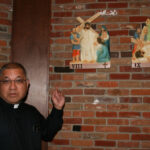“Our health and in reality, our very lives, depend on the sprouting of seeds. … The planting of seeds and nurturing them to grow to harvest is an act of cooperation with our Creator” (Catholic Rural Life, April Newsletter, April Blessing). A lack of cooperation with our Creator caused the deteriorating condition of our environment and the unchecked industrial pollution that adversely affected all of life and led to the first Earth Day on April 22, 1970. This grassroots advocacy motivated creation of the U.S. Environmental Protection Agency and the globalization of Earth Day by 1990 (earthday.org/history).
The advocacy and action cannot stop. Our faith calls us to be stewards of God’s creation, which means we ought to observe Earth Day every day by becoming educated on environmental issues and applying that knowledge in our advocacy and actions, individually and collectively. “The earth will not continue to offer its harvest, except with faithful stewardship,” St John Paul II said in a homily he delivered on California’s Monterey Peninsula in September 1987. “We cannot say we love the land and then take steps to destroy it for use by future generations. I urge you to be sensitive to the many issues affecting the land and the whole environment and to unite with each other to seek the best solutions to these pressing problems” (https://tinyurl.com/5n78nzhp).
Catholic Climate Covenant (CCC), which through its 19 national partners guides the U.S. Church’s response to climate change, challenges us with two questions based on Pope Francis’ encyclicals “Laudato Si’” and “Fratelli Tutti.” The questions “What needs doing and who’s going to do it?” come from Cardinal Michael Czerny, the pope’s “point man” on climate change. Dan Misleh, CCC’s founder, encourages all of us “to honestly wrestle with those questions,” which Cardinal Czerny posed during a recent speech. “Seeing clearly and answering boldly won’t always be easy, but we must have faith that we can do it. The stakes for our planet and for future generations could not be higher,” Misleh said (CCC April newsletter).
While we wrestle with “What needs doing and who’s going to do it,” we have opportunities to engage in activities that raise our awareness and appreciation for cooperating with our Creator in our stewardship of creation. The Iowa Department of Natural Resources website (iowadnr.gov/About-DNR/Earth-Day) offers ideas for individuals and families. Among the suggestions:
- Save a Drop. Don’t take water for granted. Save gallons a day by fixing leaky plumbing, taking shorter showers, turning off water when you’re not using it (e.g., during teeth brushing, cooking). Save roughly one-third of the family’s water bill by replacing older fixtures and appliances. Look for WaterSense and ENERGY STAR labels when purchasing. Find more tips from the U.S. EPA at epa.gov.
- Recreate Responsibly. Pick up and clean up. Be willing to pick up someone else’s trash. Volunteer for cleanup and preservation projects along your area’s rivers and creeks and in parks.
- Recycle/Upcycle. Check labels for recycling information and buy products that conserve resources, save energy and reduce waste. Buy only what you need. Then upcycle it when you are done by finding creative uses for old items. Check out ideas on the Iowa DNR’s Upcycling board on Pinterest.
- Proper disposal of hazardous materials. Contact your local solid waste agency for disposal options for corrosive, poisonous or toxic substances. Take unused hazardous materials to a Regional Collection Center for safe disposal of household solvents, pesticides, furnace thermometers and other hazardous materials.
- NatureScape. Mow grass longer, leave clippings on the lawn and minimize fertilizer use by appropriate application. Reduce pesticides and water use by planting drought- and insect-tolerant native plants, which also attract bees and butterflies. Add a rain garden to soak up excess runoff from roofs and driveways. Find more information from U.S. EPA, USDA-NRCS and Rainscaping Iowa. Go to www.pinterest.com/iowadnr for more ideas on how to help protect Iowa’s outdoors.
Also, view a list of Earth Day activities in communities in our diocese on the Iowa Environmental Council website (https://tinyurl.com/35pv4969). In addition, St. Ambrose University in Davenport is hosting an event April 21 from noon to 3 p.m. on the Rogalski Center Patio featuring tree wrapping with Living Lands and Waters, music, singers and vendors.
Here are other resources to learn more about our environment and issues affecting it:
- Diocese of Davenport’s Laudato Si’ Action Platform (www.davenportdiocese.org/laudato-si-plan).
- The Laudato Si’ Action Platform
(laudatorsiactionplatform.org).
- Iowa Interfaith Power & Light (iowaipl.org).
- Catholic Climate Covenant (https://tinyurl.com/yc249jfb).
- Earth Day website (earthday.org/earth-day-2023/).
On April 15, Catholics from four parishes in the Lee and Van Buren counties celebrated Mass on the Farm, asking for God’s grace to guide them in their stewardship of the earth. All of us, farmers or not, play a role as cooperators with our Creator for the sake of future generations.
Barb Arland-Fye, Editor
arland-fye@davenportdiocese.org












